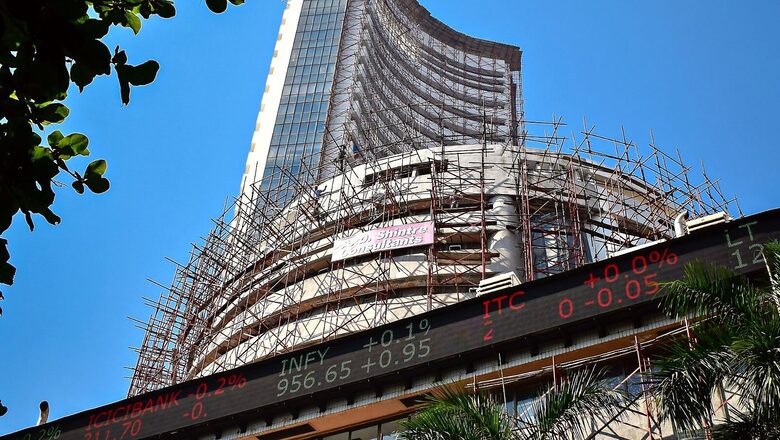
views
Dalal Street investors became richer by more than Rs 16.36 lakh crore this year, despite the year 2022 being fraught with uncertainty amid a waning pandemic, Russia’s war in Ukraine, soaring inflation, and aggressive rate hikes. The Indian markets, however, showed resilience.
Despite negative triggers, the benchmark indices – BSE Sensex and NSE Nifty50 – have reported marginal growth year-to-date (YTD) each surging around 5 per cent as of December 12, 2022, led by bank and financial stocks. Pharma and IT—which surged during the pandemic—struggled.
In the action-packed 2022, Sensex saw 1,000 plus rallies 14 times with the largest single-day gain of 1,736 points on Feb 15. On the other hand, there have been another 14 instances where the index has crashed at least 1,000 points in a day. 24th February was the worst day for Sensex when it crashed 2,702 points after Russia invaded Ukraine.
In subsequent months, the key index recouped the lost ground and has climbed 2,880.06 points or 4.94 per cent this year till December 29. Sensex touched its all-time high of 63,583.07 points on December 1 after hitting its 52-week low of 50,921.22 points on June 17.
FIIs Vs DIIs
As the US Fed began rate hikes, FIIs sold Indian stocks worth over Rs 1.2 lakh crore in 2022. Had it not been for the resilient domestic inflow, Dalal Street too might have been in the red just like Wall Street in 2022.
“Due to their feeling of exclusion and the fact that India offered the most stability, FIIs began investing in the Indian equity market in late 2022. All things considered, the market overcame every challenge and finished 2022 in a flat to positive range,” Santosh Meena, Head of Research at Swastika Investmart Ltd, said.
Outlook for 2023
Naveen Kulkarni, Chief Investment Officer, Axis Securities PMS, said: “We believe that 2023 will be a tale of two halves, wherein in the first half, due to the uncertainty of global growth, there will be increased volatility. But in the second half, we believe India will continue to attract foreign institutional investor inflows since India remains an island of stability in the current volatile global backdrop.”
According to most global estimates, India is expected to be the fastest-growing major economy not just for 2022 but also 2023, leading to higher allocation to Indian equities from global funds, especially since we expect growth to be scarce globally in 2023.
“On the domestic front, too, we expect the next year’s budget to give further impetus to ‘Make in India’ and the creation of an infrastructure that should help generate growth and employment. On the domestic flow front, we expect the strength and resilience of domestic flows to continue, especially through SIPs, which should also help support markets. Some sectors which we think should do well next year include Banking, Agri Inputs, and Industrials,” Kulkarni added.
While retaining its bullish view on the domestic equity market, brokerage ICICI Securities believes that the BSE barometer Sensex may touch the 71,600 level by December 2023. The target suggests an upside potential of 17 per cent over December 29’s closing of 61,133.88. For Nifty, the brokerage has a target of 21,500 level.
ICICI Securities predicted Nifty’s earnings per share to rise to Rs 950 level by FY24 from the projected Rs 785 in FY23 and Rs 515 in FY21.
ICICI Securities said that investors should zero in on select investment themes to make money in calendar 2023. This includes the electrification trend which is accelerating across categories in the auto space and banking sector which is poised for the next round of the re-rating cycle. It further advised investors to focus on themes related to capex.
“We expect central government allocation to capex to grow 18 per cent YoY in CY23 led by sectors like railways, defence, housing and roads, thereby exhibiting 23.5 per cent CAGR in capex allocation over FY19-24,” ICICI Securities said.
FMCG, retail, hotels, hospitals, defence, textiles, logistics and telecom are among the other sectors which may stay in limelight in 2023, the brokerage said adding telcos treading a robust growth trajectory in the medium term with an overall industry structure being favourable (two strong player market), along with a chunk of capex cycle, already done and under process currently.
Read all the Latest Business News here


















Comments
0 comment